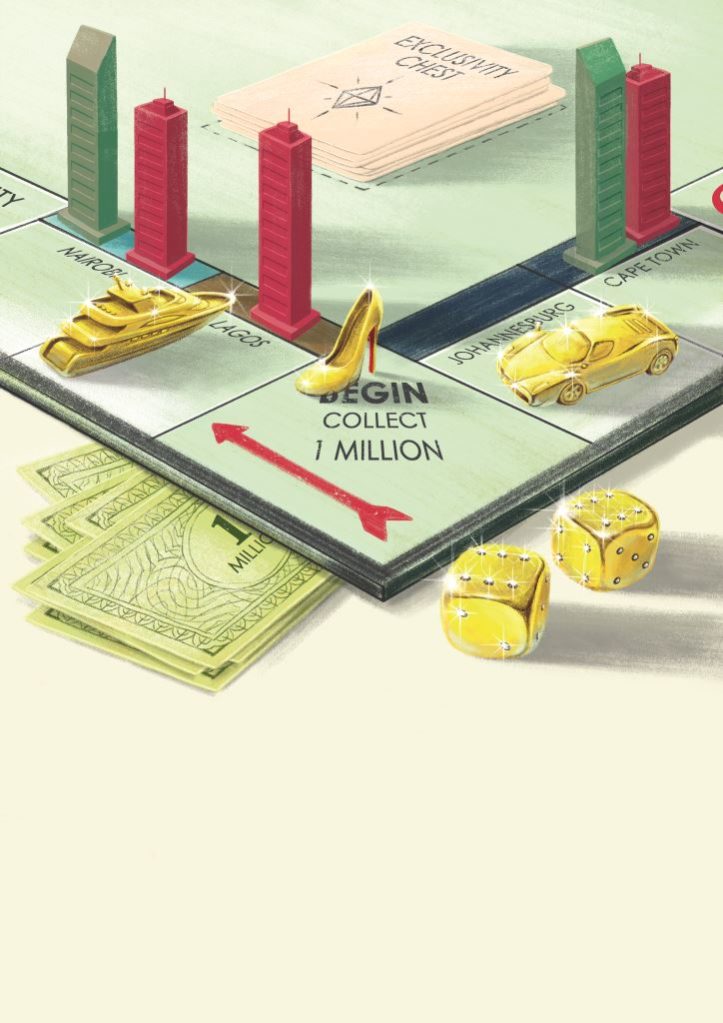There are 163,000 of them, and many of them have been in this magazine. They are prepared to pay $3.5 million for a place to sleep.
That’s the number of dollar millionaires in Africa, according to a report by New World Wealth; a Johannesburg research company.
According to the report, Johannesburg has 46,800 millionaires. About 600 of those have over $30 million. Egypt is next with 20,200 millionaires; Nigeria with 15,400 and Kenya 8,500.
African high net worth individual numbers have increased by 145% in the past 14 years compared to the worldwide growth rate of 73% over the same period. Angola is the top performing African country with growth of just over 480%, according to the study.
With rising numbers of millionaires in Africa, what do they do with their money?
Loading...

Property is popular.
While Johannesburg is home to most wealthy South Africans, Cape Town is not far behind. The most expensive spots for prime property in Africa are the V&A Marina, Clifton and Bantry Bay in Cape Town.
According to the Western Cape Managing Director of Pam Golding Properties, Laurie Wener, South Africa’s wealthy buy Cape Town trophy properties on the famous Atlantic Seaboard or in Bishopscourt for no less than $1.4 million.
“The wealthy also invest in smaller apartments in different areas, sometimes off plan, for relatively good rental returns and medium to long-term capital growth. They buy properties off plan speculatively for short-term growth by the time they take transfer and commercial investors generally look for higher returns and often buy in partnerships or syndicates and to hold long term,” she says.
The ambitions of the rich also reach 143 meters above the Sandton skyline. Here in the clouds over the Michelangelo Towers, a penthouse is on sale for $3.5 million. That’s a record.
Rupert Finnemore of Pam Golding Properties, in Hyde Park, says that the previous highest price in Sandton City shopping centre is $3.1 million.
The striking Diamond Walk at Sandton City dazzles with a brilliant new clutch of the world’s most wanted brands such as Prada, Dolce & Gabbana, Giorgio Armani, Burberry, Ermenegildo Zegna, Billionaire Italian Couture, Jimmy Choo, Tod’s and Arque Champagne Crescent.
“Sandton City’s new Diamond Walk adds yet another luxurious dimension to the ultimate shopping variety and experience on the continent,” says Alex Phakathi, Stanlib Fund Manager for the Liberty Property Portfolio.
The Diamond Walk was built on the high demand from the wealthy as the African luxury sector generated an estimated $8 billion in revenue in 2014; with $2.8 billion coming out of South Africa.
Collectables such as art, wine and classic automobiles are increasingly popular and accounted for $5.3 billion of the total assets of African high net worth individuals at the end of 2014, according to New World Wealth.
The company estimates $32 million was generated in South African sales of watches alone in 2014; up from $23 million in 2013.

“A few years ago, wealthy South Africans had to order these watches through relevant retailers overseas or travel to places such as Bond Street in London to buy them. Now, most of these brands can be purchased over the counter from South African stores,” says wealth analyst Andrew Amoils of New World Wealth.
The rich also spend their time and money relaxing at sea. Amoils says the South African yacht industry generates about $150 million per year.
According to the study, Angola and South Africa are the top spots for yachting in sub-Saharan Africa. Morocco and Egypt are the top spots in North Africa. The yacht owners are mostly male, between the ages of 40 to 50, with average earnings of over $300,000 per year.
Mauritians are the wealthiest in Africa with $21,470 in wealth per person while people in the Democratic Republic of Congo are the poorest with $230 per person, according to Amoils.
“If you look at the asset allocation of the average South African millionaire, about 30% of their assets are in business interests, 25 % in equities, about 20% in property and then rest will be in cash, fixed income instruments, bonds and alternative investments like collectables like art,” says Amoils.
The ambitions of Africa’s elite are high.
Loading...
